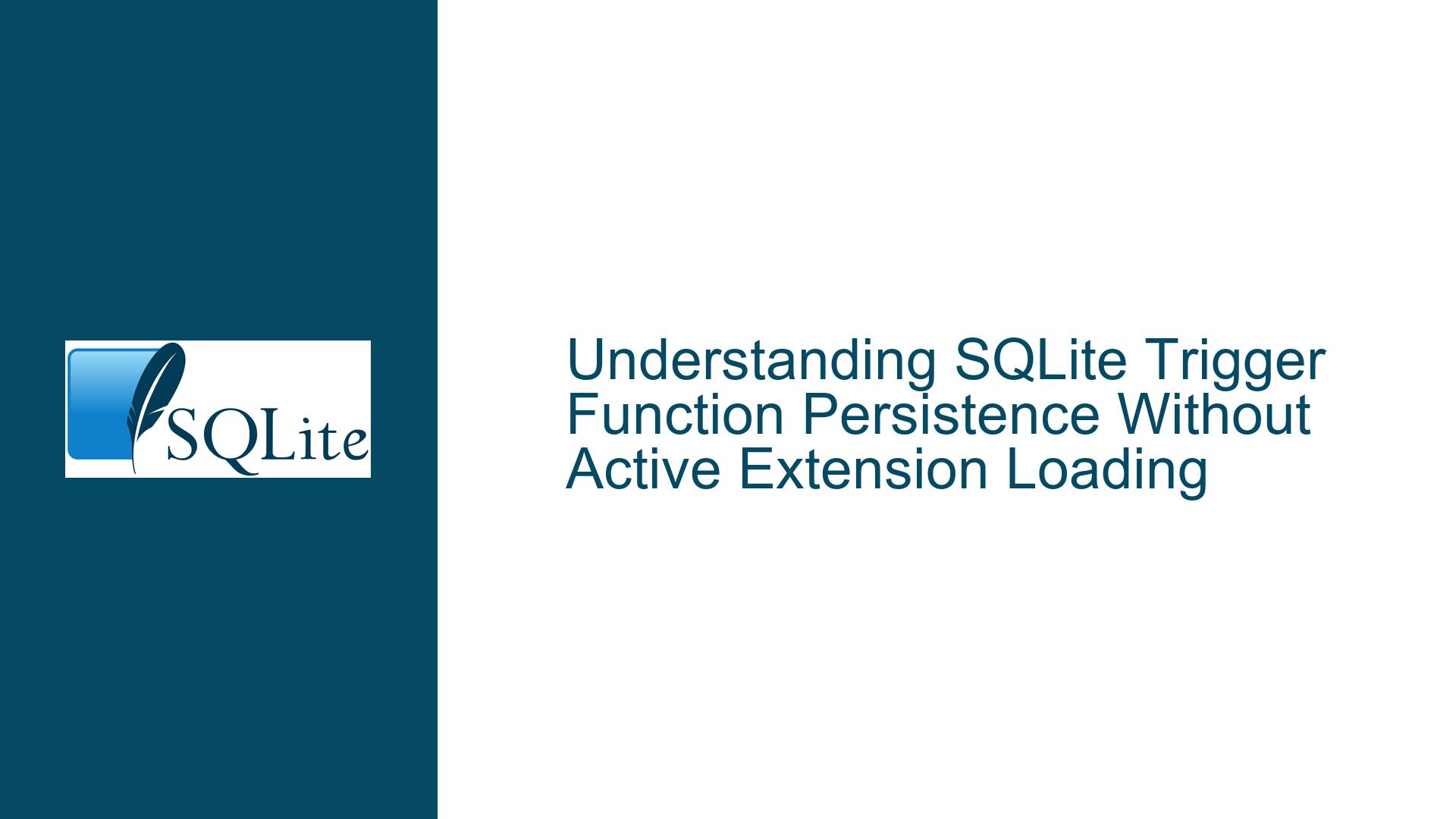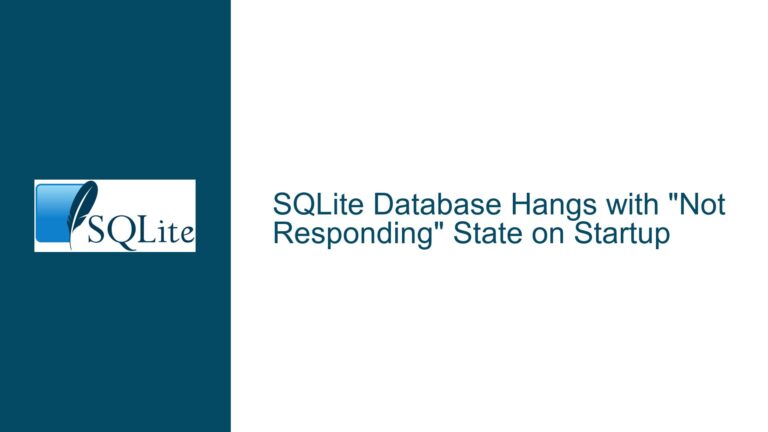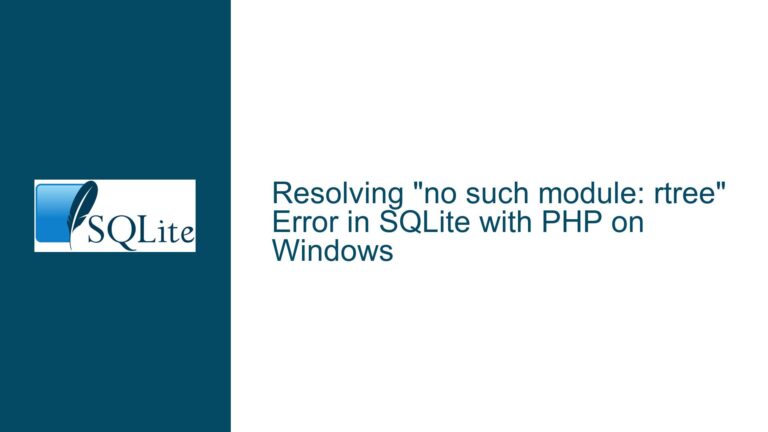SQLite Trigger Function Persistence Without Active Extension Loading
Issue Overview: Trigger Execution Relies on External Functions Despite Apparent Absence of Extension
When working with SQLite, users may encounter scenarios where triggers or indexes utilizing functions from external extensions (such as reverse() from extensionfunctions.so) continue to operate even after the extension is no longer explicitly loaded. This behavior can create confusion, as SQLite does not natively support these functions, and extensions are typically loaded per connection. The core issue revolves around understanding why a trigger referencing an extension-based function remains functional across sessions or applications without manual reloading of the extension.
Key Observations
- Extension Dependency in Triggers: A trigger is created using a function (e.g.,
reverse()) provided by an external extension loaded during the trigger’s creation. The trigger executes successfully even after restarting SQLite or accessing the database from another interface (e.g., a web application) without reloading the extension. - Function Availability Discrepancy: Direct use of the extension function (e.g.,
SELECT reverse('test');) fails in new sessions where the extension is not loaded, but the trigger continues to execute without errors. - Implicit vs. Explicit Extension Loading: The root cause often lies in implicit extension loading by frameworks or applications (e.g., Django) that interact with the same database. These frameworks may automatically load extensions to enable specific features, creating the illusion that the extension is "persisted" within the database.
Technical Context
- SQLite Extensions: Extensions like
extensionfunctions.soprovide user-defined functions (UDFs) or collations. These are loaded dynamically at runtime and are not stored in the database schema. Functions referenced in triggers or indexes are resolved at execution time, relying on the availability of the function in the current connection’s environment. - Trigger Definition Storage: Triggers store the name of the function (e.g.,
reverse()), not its implementation. SQLite validates the function’s existence during trigger creation but does not enforce its availability during execution. If the function is missing when the trigger fires, SQLite raises an error. However, if another process or framework loads the extension, the function remains available to triggers executed within that context.
Example Scenario
- A user creates a trigger using
reverse()after loadingextensionfunctions.soin a SQLite shell. - The user closes the shell and starts a Django application that interacts with the same database.
- The trigger executes successfully when the Django application modifies data, even though the user did not explicitly load the extension in Django.
- Attempting to call
reverse()directly in a new SQLite shell session fails unless the extension is reloaded.
This discrepancy arises because the Django framework automatically loads the extension (e.g., to support specific ORM features), while the SQLite shell does not. The trigger’s dependency on reverse() is satisfied by the framework, not the database itself.
Possible Causes: Implicit Loading, Framework Behavior, and Function Resolution
1. Implicit Extension Loading by Applications/Frameworks
Frameworks like Django often load SQLite extensions to enable functionality required for ORM operations or feature parity with other databases. For example:
- Django might load
extensionfunctions.soto supportReverse()annotations in queries. - This loading occurs transparently, creating the false impression that the extension is "embedded" in the database.
2. Static Linking of Extensions
If the SQLite library used by the application (e.g., Django’s SQLite driver) is compiled with extensions statically linked, functions like reverse() become permanently available without dynamic loading. This is common in embedded systems or custom SQLite builds.
3. Multiple SQLite Environments
Different applications (e.g., SQLite shell vs. Django) may use separate SQLite instances with varying extension-loading configurations. A trigger created in one environment may execute successfully in another if the latter loads the required extension.
4. Cached Extensions in Connection Pools
Applications with connection pools might retain loaded extensions across connections, causing functions to remain available even after restarting the application.
5. Misleading Function Name Collisions
A function with the same name as the extension’s (e.g., a custom reverse() defined in another library) might be present in the application, masking the absence of the original extension.
Troubleshooting Steps, Solutions & Fixes
Step 1: Isolate the Execution Environment
- Test in a Minimal Context: Use the SQLite shell without frameworks to verify extension dependencies:
sqlite3 db.sqlite3 sqlite> INSERT INTO tablename (col1) VALUES ('test'); # Trigger execution should fail if extension is missing. - Delete or Rename the Extension File: Move
extensionfunctions.soto a different directory and test trigger execution. If it still works, another process is loading the extension.
Step 2: Audit Framework and Application Configuration
- Review Framework Documentation: Check if frameworks like Django load extensions implicitly. For Django, inspect
settings.pyforOPTIONSlikeconnection.extensions:DATABASES = { 'default': { 'ENGINE': 'django.db.backends.sqlite3', 'NAME': 'db.sqlite3', 'OPTIONS': { 'extensions': ['extensionfunctions'], }, }, } - Monitor SQLite Connections: Use tools like
strace(Linux) or Process Monitor (Windows) to trace file accesses and identify when/whereextensionfunctions.sois loaded.
Step 3: Verify Function Availability
- List Loaded Functions: Execute
SELECT * FROM sqlite_master WHERE type = 'trigger';to identify triggers and their dependent functions. Then, check function availability:PRAGMA function_list;Look for
reversein the list. If it appears without manually loading the extension, another process has loaded it.
Step 4: Recreate the Trigger with Explicit Guards
Add a check to ensure the function exists before trigger execution:
CREATE TRIGGER triggername
AFTER UPDATE ON tablename
BEGIN
SELECT CASE
WHEN reverse('test') IS NULL THEN RAISE(ABORT, 'reverse() function missing')
ELSE NULL
END;
UPDATE tablename SET col1 = reverse(new.col1) WHERE id = new.id;
END;
Step 5: Standardize Extension Management
- Document Dependencies: Clearly note required extensions in project documentation.
- Automate Extension Loading: Use initialization scripts or framework hooks to load extensions consistently:
from django.db.backends.signals import connection_created def load_extensions(sender, connection, **kwargs): if connection.vendor == 'sqlite': connection.connection.enable_load_extension(True) connection.connection.load_extension('/path/to/extensionfunctions.so') connection_created.connect(load_extensions)
Step 6: Validate Across Deployment Environments
Ensure extensions are deployed and loaded identically in all environments (development, staging, production). Use infrastructure-as-code tools (e.g., Docker, Ansible) to enforce consistent paths and permissions for extension files.
Step 7: Mitigate Security Risks
- Avoid Untrusted Extensions: Loading extensions from unverified sources can expose systems to code injection.
- Sandbox Critical Databases: Restrict databases using extensions to environments where the extensions are vetted and controlled.
By systematically isolating the execution environment, auditing framework behavior, and enforcing consistent extension management, users can resolve the apparent "dark magic" of persistent trigger functionality and avoid unexpected errors in production systems.






